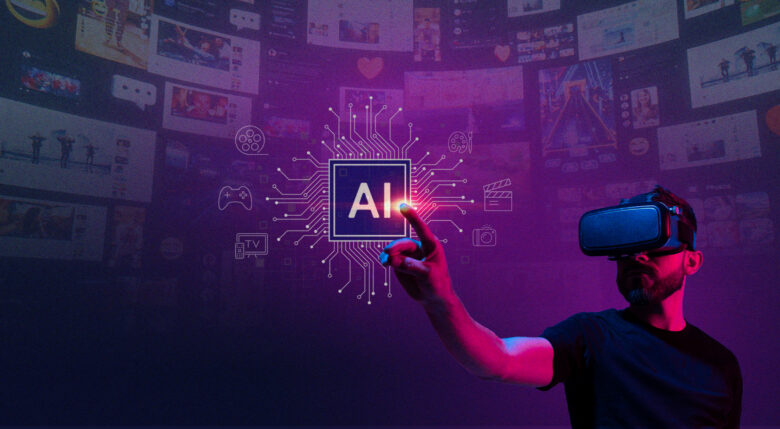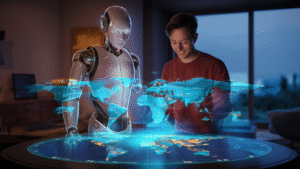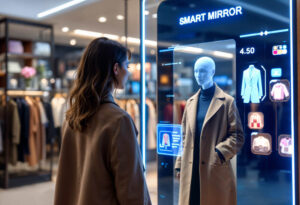Entertainment has always evolved with technological advancements, but the introduction of AI (AI) to entertainment apps has revolutionized the way we interact with entertainment and leisure. From personalized playlists to enthralling gameplay experiences, AI has been central to entertainment. It offers better, faster, and more engaging ways to make the most of your time. Be it streaming movies or creating videos ogaming,ng AI-powered apps have made activities more fun and more accessible than ever before.
Personalization and Recommendations
A major and attractive advantage of AI used in apps for entertainment is the ability to provide content that is personalized. Analyzes user preferences as well as their behavior and the amount of time they spend on specific types of content to provide recommendations that make you feel as if they were designed specifically for you. Consider the way Spotify curates playlists, such as Discover Weekly, or how Netflix recommends movies based on your watching habits. This personalized approach not only saves time but also improves the user’s experience by coordinating content to their personal preferences.
Interactive and Immersive Experiences
AI has also enhanced entertainment by providing immersive and interactive experiences. Virtual Reality (VR) and Augmented Reality (AR) have been transformed thanks to AI to create realistic environments and simulations for the users. From virtual concert halls to AI-powered escape rooms, the world of entertainment is now embracing possibilities that were not possible just a couple of years ago. AI can make real-time experiences that feel authentic and blur the boundaries between reality and the virtual world.
Gaming Enhanced by AI
There are few industries that have embraced AI in the same way as the gaming industry. AI in gaming makes intelligent NPCs (NPCs) that respond dynamically to player actions, making the game fun and challenging. AI also drives the generation of procedural characters in games, creating vast, vibrant worlds that feel new every time you engage in them. Mobile games, too, benefit from AI by integrating adaptive difficulty levels as well as predictive analysis to enhance game experience.
The Role of AI in Music and Audio Apps
The impact of AI on audio and music apps is enormous, which opens up new possibilities for creativity. Services such as Apple Music or YouTube Music make use of AI algorithms to make precise recommendations based on user behavior. Beyond personalization, certain apps make use of AI to create beats or compose music that allows users to make their own audio tracks easily. AI has also allowed real-time audio optimization for live audio and podcasts, making professional-quality audio production available to anyone.
AI in Video and Streaming Platforms
AI plays a crucial role on platforms such as YouTube, TikTok, and streaming giants such as Netflix or Amazon Prime. AI helps these platforms analyze user preferences and recommend videos you’re likely to share and watch. It also improves editing of videos by offering features such as the ability to detect scenes and automatically clip and caption. Streaming in ultra-high-definition resolutions and combating buffering issues with AI-driven video compression have also reshaped how users consume content.
Creative Tools and Content Creation
For artists, AI-powered tools are an important game changer. Because of AI applications, such as Canva, which provide suggestions for design automation, and video editing tools, such as CapCut and Runway, which allow users to edit videos using no technical expertise,. Writers also enjoy AI-driven applications that offer changes to the phrasing of their writing or help them brainstorm new ideas. AI can make creativity more accessible by putting high-quality tools available to all regardless of their skill level.
The Future of AI in Entertainment
With the speed of AI technology and the promise of AI-powered entertainment, there are endless possibilities. Imagine hyper-personalized virtual environments that adapt to your interests or AI-aided live performances in which artist avatars appear across the globe. Machine learning and other emerging technologies, such as generative AI (e.g., ChatGPT and DALL-E), are currently pushing the limits of imagination and interactivity in entertainment.
Ethical Considerations and Challenges
Naturally, the growth of AI in the field of entertainment doesn’t come without its difficulties. Privacy concerns about data as well as algorithmic biases and the ethical implications of AI are often a source of concern for the public and both users. For instance, the excessive personalization of content could entrap users into echo chambers of digital noise, which limit their exposure to different opinions. In addition, some creators have expressed worries about AI being able to replace human artists and provoking debates over the relationship between the creative and automated aspects of entertainment.
The Impact of AI on Fun and Leisure
AI-powered entertainment apps are much more than just cutting-edge devices that are transforming the way we enjoy fun and leisure in a profound way. From offering personalized suggestions to facilitating creativity for everyone, AI’s role in entertainment is certainly enhancing our lives in the everyday. However, as we marvel at the possibilities, keeping an eye on the highest standards of ethics and responsible advancement for AI can ensure this cutting-edge technology is able to improve our common enjoyment.
FAQs
1. What can AI enhance personalization in games?
AI employs machine learning algorithms to study user data and identify patterns and preferences to suggest targeted content like music, movies, games, or even music.
2. What are some examples of AI in games?
AI improves gaming through the creation of more intelligent NPCs, which can be used to create artificially generated environments and enhance experiences, including adjustable difficulty levels for the game.
3. Are AI-generated artworks taking over human art?
AI can provide tools that aid in human creativity instead of replacing it. Although some are concerned that automation could take over production of content, AI is primarily used as a tool for collaboration.
4. Can AI-powered applications help protect the privacy of users?
The leading AI-powered platforms are focused on implementing strict data security measures to safeguard the privacy of users and to adhere to the regulations for data compliance.
5. What kind of challenges do AI developers confront in the entertainment industry?
Challenges include addressing algorithmic biases, mitigating over-personalization, ensuring user data privacy, and finding ethical approaches to integrating AI into entertainment.




